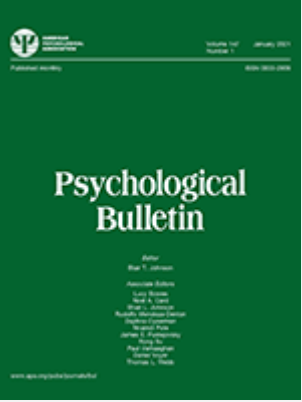Does the apple fall far from the tree? A meta-analysis linking parental factors to children's intrinsic and extrinsic goals.
IF 19.8
1区 心理学
Q1 PSYCHOLOGY
引用次数: 0
Abstract
Self-determination theory (Ryan & Deci, 2017) has highlighted the differential roles that intrinsic life goals (for personal growth, close relationships, community connections, and physical health) and extrinsic life goals (i.e., for wealth, image, and status) play in supporting well-being. Less is known about how orientations toward these two types of aspirations develop. It is likely that early environmental influences, namely one's parents, impact individuals' aspirations. We address this gap by systematically reviewing the links between relevant parents' characteristics and the intrinsic and extrinsic goals of their children. We identified 49 eligible reports. Children's intrinsic aspirations were higher when parents provided a need-supportive environment (characterized by support for autonomy, relatedness, and competence) and when they endorsed intrinsic aspirations themselves, whereas children's extrinsic aspirations were higher when parents exhibited extrinsic aspirations themselves, promoted the pursuit of extrinsic aspirations, and provided environments characterized by need frustration. Therefore, fostering basic psychological need satisfaction may support children's intrinsic aspiring. In addition, parents should also be mindful of their own extrinsic goals, as they may influence extrinsic aspirations in their children and possibly compromise their well-being over the long term. (PsycInfo Database Record (c) 2024 APA, all rights reserved).苹果会从树上掉下来吗?将父母因素与儿童内在和外在目标联系起来的荟萃分析。
自我决定理论(Ryan & Deci, 2017)强调了内在生活目标(个人成长、亲密关系、社区联系和身体健康)和外在生活目标(即财富、形象和地位)在支持幸福感方面的不同作用。人们对这两类愿望是如何形成的知之甚少。早期的环境影响,即父母,很可能会影响个人的愿望。我们通过系统回顾父母的相关特征与其子女的内在和外在目标之间的联系,弥补了这一空白。我们确定了 49 份符合条件的报告。如果父母提供了一个支持需求的环境(以支持自主性、相关性和能力为特征),并且他们自己也认可内在愿望,那么孩子的内在愿望就会更高,而如果父母自己表现出外在愿望,促进追求外在愿望,并且提供了以需求受挫为特征的环境,那么孩子的外在愿望就会更高。因此,促进基本心理需求的满足可能会支持儿童的内在愿望。此外,父母还应注意自己的外在目标,因为它们可能会影响子女的外在愿望,并可能长期损害他们的幸福。(PsycInfo Database Record (c) 2024 APA, 版权所有)。
本文章由计算机程序翻译,如有差异,请以英文原文为准。
求助全文
约1分钟内获得全文
求助全文
来源期刊

Psychological bulletin
医学-心理学
CiteScore
33.60
自引率
0.90%
发文量
21
期刊介绍:
Psychological Bulletin publishes syntheses of research in scientific psychology. Research syntheses seek to summarize past research by drawing overall conclusions from many separate investigations that address related or identical hypotheses.
A research synthesis typically presents the authors' assessments:
-of the state of knowledge concerning the relations of interest;
-of critical assessments of the strengths and weaknesses in past research;
-of important issues that research has left unresolved, thereby directing future research so it can yield a maximum amount of new information.
 求助内容:
求助内容: 应助结果提醒方式:
应助结果提醒方式:


